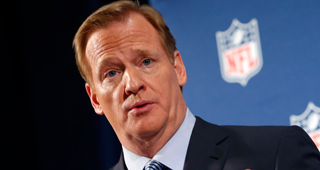Three of the NFL's top health and safety officers confronted the National Institutes of Health last June after the NIH selected a Boston University researcher to lead a major study on football and brain disease.
The report contradicts denials by the NFL and a foundation it partners with that they league had any involvement or input in the fate of a $16 million study to find methods to diagnose chronic traumatic encephalopathy, a brain disease found in dozens of deceased NFL players.
Outside the Lines reported in December that the NFL, which in 2012 promised an "unrestricted" $30 million gift to the NIH for brain research, backed out of funding the new study over concerns about the lead researcher, Boston University's Dr. Robert Stern, who has been critical of the league. In the story, a senior NIH official said that the NFL retained veto power over projects it might fund with its donation, and it effectively used that power in the Stern study. Almost immediately, NFL spokesman Brian McCarthy deemed the report "inaccurate."
Dr. Walter Koroshetz, director of the National Institute for Neurological Disorders and Stroke, told Outside the Lines this week that the NFL raised several concerns about Stern's selection during a June conference call that included Jeff Miller, the NFL's senior vice president for health and safety; Dr. Richard Ellenbogen, co-chairman of the Head, Neck and Spine Committee; and Dr. Mitch Berger, chairman of the sub-committee on the long-term effects of brain and spine injury.
The NFL declined to address questions about the concerns it raised to the NIH. In a statement Wednesday, Miller said the "NIH made the decision to move forward with the BU study with its own funds and to use NFL funds" for another CTE project.
"The NFL has no veto power as part of its $30 million grant to the FNIH," Miller said. "We recognize NIH has final approval on its funding decisions."


